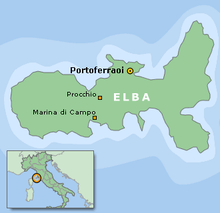| |||||||
| Capital (and largest city) |
Piombino | ||||||
| Language official |
Italian | ||||||
| others | French | ||||||
| Demonym | Elban | ||||||
| Government | Constitutional Monarchy | ||||||
| Legislature | Senate of Elba | ||||||
| Prince of Elba | Napoleon VII | ||||||
| Royal house: | Bonaparte | ||||||
| Established | 1814 | ||||||
| Currency | Elban Lira | ||||||
The Principality of Elba, commonly referred to simply as Elba, is an island nation in the Ligurian Sea, off the coast of Italy. It was established in 1814, as a sovereign territory for the exiled French emperor, Napoleon I. Prior to that, it was part of Naples.
A highly-developed first-world country. With a population of about 31,500, it has the highest GDP per capita in the world, and has the world's third largest human development index, and is a well-known tax haven. Elba is a member of the European Union, and the United Nations.
History[]
Elba has been inhabited since neolithic times. It has been a pawn of many Italian states: the Etruscans, the Romans, the Ostrogoths, and Naples. During the Napoleonic Wars, Napoleon incorporated the island into the newly-created Kingdom of Etruria.
With the end of the Napoleonic Wars in 1814, the Congress of Vienna decided to award the island to the defeated Napoleon. He was allowed to retain his title of Emperor, and rule Elba as an independent principality.The emperor arrived in his new realm on the 18th of April, 1814, with a guard of 1,500.
As soon as he arrived, the Emperor set about bettering his new country. He built roads, constructed museums and concert halls, repaired the docks and established the military. The local population, although initially unsure about their new sovereign, quickly warmed to him. Thanks to imperial patronage, the vinyards of Elba quickly became profitable, and helped kickstart the local economy.
Napoleon I died peacefully in 1833, having penned his bestselling memoirs, Life of a Corsican. He was succeeded by his only son, Napoleon II, l'Aiglon. The new Napoleon, unlike his warrior father, was not allowed to style himself emperor, and so Elba changed from the world's smallest empire to a mid-sized principality.
The new emperor was a patron of the fine arts, patronising local musicians, artists and writers. Under his reign, the Elban Opera House was built. The first production performed in the theatre was Donezetti's famous opperetta, L'Aiglon, written and performed in the prince's honour.
Napoleon II's reign was not all a bed of roses, however. In the 1850s, King Victor Emmanuel of Sardinia began his campaign of Italian unification. As the northern states fell, Napoleon II felt that Elba would be swept up in the unification. So Napoleon II joined the Anti-Unification Coalition, headed by his cousin, King Lucien of Naples, Pope Pius IX, and King Ferdinand II of Sicily.
A division of two hundred soldiers was fielded in the Wars of Unification, and they played a small if vital role in saving the defence of Naples. With the end of the wars on 1862, Elba was the founding member of the Union of Independent Italian states, along with Naples, Sicily, Piombino and San Marino.
With Elba's independence secured, Napoleon II was able to live out his life peacefully, and died in 1876. He was succeeded as prince by his 44 year old son, Maximillian.
Maximillian was a savvy monarch. In tune with the times, he established the Elban Senate, giving it extensive powers. He personally invested millions of liras in the Elban Casino, which, over the course of just three years, made Elba the richest Meditteranian nation per capita. The casino was beneficial to the local wine industry, so that the principality had a fully-functioning economy.
Staying neutral in the First World War, Elba couldn't stave off the post-war depression. Without rich playboys to fill the casinos and buy the nation's wine, the economy began to collapse. But, after years of rock-bottom, new, Nazi playboys began filling the casinos- and the island's coffers.
The principality was occupied by fascist Italy during the Second World War. Prince Hector became a guiding force for the Elban Resistance, secretly supplying them with food, funds, and weapons. He was chosen by the leaders of the resistance to accept the Instrument of Surrender of the Italian troops in Elba.
The Island continued in its successful path throughout the rest of the Twentieth Century. Prince Hector died in 1971, at the grand old age of ninety. He was succeeded by his son, Napoleon III, who was in turn succeeded in 2003 by the current prince, Maximillian II.



